Nitrogen or regular air tires? Let’s just say that regular air tires you are using now should be enough for your need unless you are taking part in NASCAR Cup Series or you need to turn your car into an aircraft.
But, there is nothing wrong that you want to try out something cooler. In fact, there are many people have tried nitrogen air tires, so you could be some of them.
But before you make up your mind, perharps you should understand what it is first. Here is all what you need to know about nitrogen air tires.
Nitrogen vs Air In Tires
What exactly is Nitrogen?
High school teachers may tell you about this, but let’s walk through about it again. Nitrogen is an inert, non-flammable, colorless gas. There is a misunderstanding that most of the amostphere we are breathing is oxygen. Actually, 78% of the air is nitrogen, 21% is oxygen, 1% left is other gasses such as noble gasses (neon, argon), water vapor and carbon dioxide.
How can Nitrogen help?
1. Maintain air tire pressure better
It is an ideal to maintain the pressure of the air. Proper level of pressure will keep the tire in the best condition of shape and therefore, the friction between the tire and road surface will be adequate to keep the car stable as well as not slowing it down. In addition, the tire which is full enough will not afford another the pressure from the flage pushing down and the contact area between tire and the surface is kept reasonable, the tires will last longer and the rate of causing flat tire is reduced.
Every tire has pores that the air inside could slip out through. Although those pores are impossible to notice in normal conditions, air molecule will not be kept in forever, especially when there are more factors affecting the tire such as heat. For each 10-degree temperature increase or decrease, the tires lose 1 psi. With regular air tire, this kind of pressure loss usually happens, so you need to regularly check and pump the tire up to standard pressure.
Otherwise, this is another story with nitrogen air tires. Since the molecule of Nitrogen is significantly bigger than Oxygen molecule, it will not be easy for Nitrogen gasses to seep out through tire pores. If the tires are filled with Nitrogen gasses, the speed of pressure loss can be 3-4 times slower than using regular air.
With Nitrogen, car tires will be able to retain inside of it for a longer time, you don’t need to check tire pressure as regularly as when using normal air. As a result, the car will maintain the stability better.
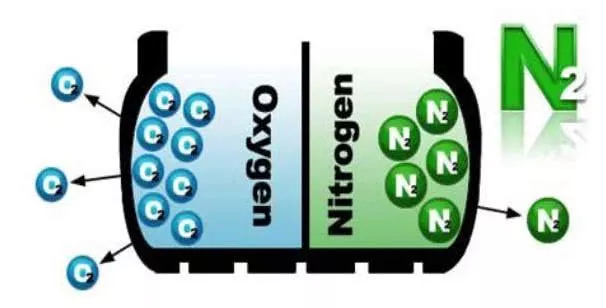
Nitrogen molecule is bigger than Oxygen molecule and not easy to escape from tire pores
Actual result
In order to actually compare the pressure loss speed between using Nitrogen air and regular air tires, Consumer Report did a study which lasted for a long time. The result has shown that, using tire with Nitrogen air did slow the process of losing tire air pressure. But, the amount of pressure saved is 1.3 psi. Obviously, this number is not significantly convincing enough for us to turn to Nitrogen air.
>>> You may like to read:
2. Increase fuel effiency
As above we said that using nitrogen air will keep the pressure level at good point and the tires will have lower chance to be flat. As the result, fuel will be used more effectively. There is a connection between tire air pressure and fuel. The U.S. Environmental Protection Agency (EPA) reported that driving with flat tires will cause your car to waste fuel 0.3% faster for every 1psi decrease in pressure for all tires. Inversely, properly and adequately pumped up tires will increase the gas mileage by 3.3%.
For that reason, maintain the inflation for all four tires will save you some money. But it doesn’t mean that inflation is enough to reduce fuel costs. The truth is that, to save fuel, you must keep the tire air pressure under control, in other words, you need to maintain a proper level of pressure.
Therefore, a tire-pressure monitoring system will be what you need. To keep tire pressure at recommended level, you just need to check at least once or twice a month to be sure. It will take you some time, but it will help you reduce that cost in buying fuel.
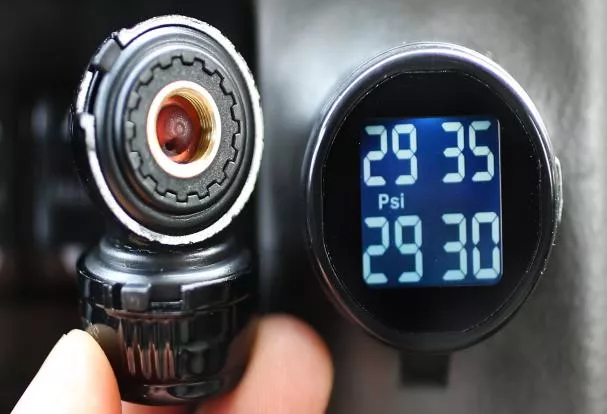
Use tire-pressure monitoring system in addition to Nitrogen air to save fuel
Speaking of that, cost for each tire to be inflated with nitrogen gas for one time is around P50 - P100. That means that it costs P200 - P400 for every refill in 3 - 4 months. Let’s make it up to P500 to ensure you have a perfect refill for the next few months without spending any money for this.
>>> Worth your note: The pros and cons of filling tires with nitrogen: Is it worth the hassle?
3. Prevent wheel corrosion and increase tire lifetime
One of the reasons causing wheel corrosion is humidity. Regular air which contains oxygen and water vapour, will reinforce process of wheel corrosion, making them to age faster. In some cases, humidity and heat are so high that make steel belts become rusty.
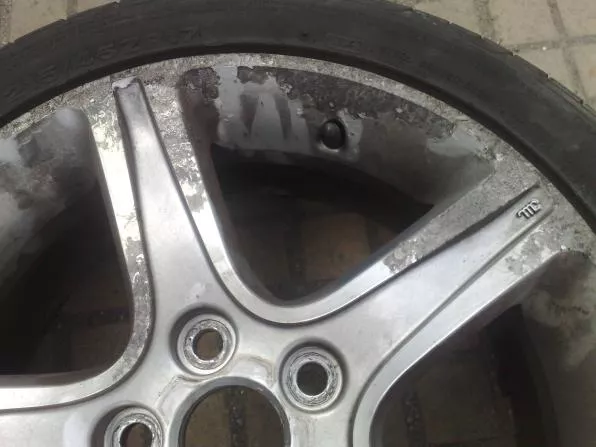
One of the reasons causing wheel corrosion is humidity
Nitrogen is much drier than traditional air. Therefore, inflating tires with 93-95% pure nitrogen will help resolve the problem.
In fact, many car experts said that, those cars which are driven under normal conditions still cause their tires to reach their minimun usable depth before the tire wall begins to be oxidized. In other words, whatever the case, the corrosion will happen sooner and faster on the outside than from the inside. You could say that, the corrosion is inevitable, the matter is how soon, when and where it manifests first, inside or outside of the tires.
>>> Related: How to correctly put air into tires [Philkotse Guide]
4. Keep tire temperature stable
As said above, regular air includes a bit of water vapour. In the pressurized condition, water vapour turns into liquid and can be transfer into the tires. When car is moving, the tires heat up and they once again turn back into gases. Keep in mind that, gasses occupy more volume than liquid. For that reason, when the temperature of the tires goes up, so does the pressure which the tires have to afford. The tires are no longer in standard pressure level.
Meanwhile, nitrogen contains no or least water vapour, consequently it will not increase the pressure inside the tires.
Based on science theory, that is totally true. But ExxonMobil has put out a study in 2008 showing that the increase temperature is not significant to be mentioned.
5. Nitrogen or regular air tires? It’s time to decide which one you should go for
To sum up, nitrogen air is helpful for two purposes. The first one is for racing drivers who need to reduce pressure on tires and increase car performance. The other is for those who don’t use car much, especially those who own a classic or vintage car.
Otherwise, if you use your car mainly to work or travel frequently, you will not find any help from it. Also, nitrogen is not the best option because not many gas stations have nitrogen filling service available.
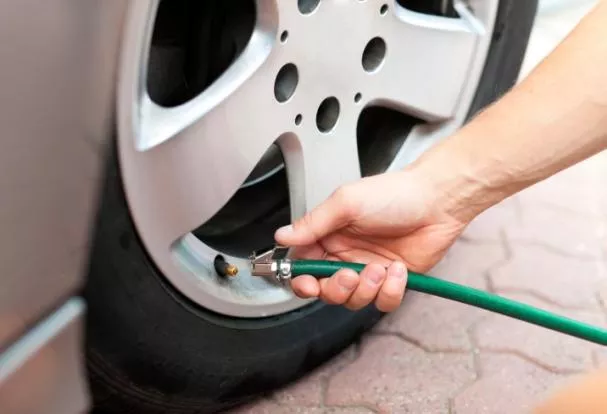
Nitrogen air tire has some advantages but only with particular type of car. Consider whether you need it or not.
As mentioned in the beginning, there is no limit for you. The decision is yours. We hope what we have been gone through will help you have a wise choice.
>>> Click to catch more useful tips and advice for car owners

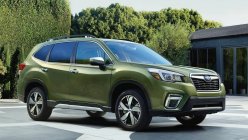


![[FOR FUN] Top 5 anime series that car enthusiasts will love](https://img.philkotse.com/crop/94x52/2019/11/06/xgWRvxxG/top-anime-for-car-lovers-5c8c.jpg)






